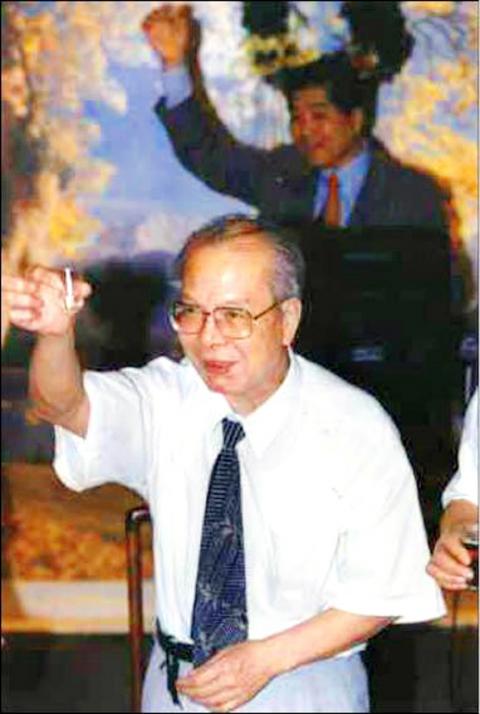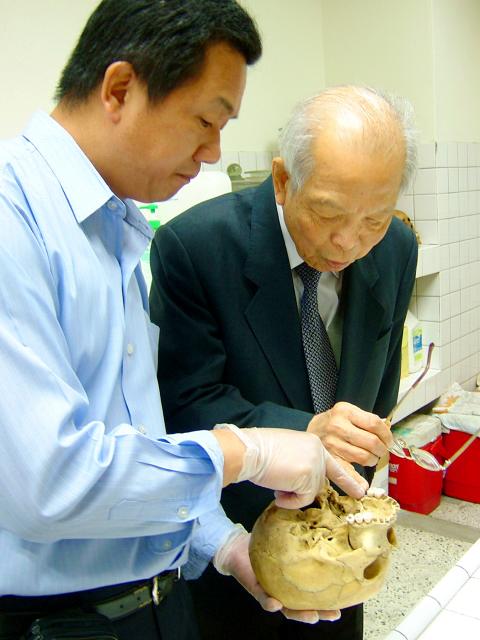Taiwan in Time: Nov. 21 to Nov. 27
In 1949, a university couple allegedly hung themselves with a single noose near a watergate by the Tamsui River. The man claimed that he survived by inserting his finger between his neck and the rope, and the woman’s suicide note was published in the newspapers to great sensation.
The forensics expert at the local police district declared that they were lovers who committed suicide together, but suspecting foul play, the Taiwan Provincial Police Administration sent their promising 21-year-old intern, Yang Jih-sung (楊日松), to double check the results.

Photo: File, Taipei Times
This was Yang’s first case as a forensics expert. Decades later, he would be known as Taiwan’s Sherlock Holmes or Bao Qingtian (包青天, a legendary justice in ancient China) — but now he was still a student at Taipei Medical University, both nervous and eager to prove himself.
Yang quickly deduced that the noose was not large enough to fit two people, and the man admitted to staging the scene after killing the woman and forging the note.
Thus began the 49-year career of Yang, during which he reportedly dissected more than 30,000 bodies, including many widely-publicized cases.

Photo: Chiu Chun-fu, Taipei Times
UNUSUAL METHODS
Born on Nov. 23, 1927 in Miaoli, Yang was the only one in his graduating class at Taipei Medical University to specialize in forensic science.
Tang Kun-shan (湯坤山) and Hsu Huei-chin (徐慧琴) write in their book The Legend of Yang Ri-song (楊日松傳奇) that his career choice stems from two injustices he witnessed growing up: the forced confession and three-month imprisonment of his elder brother in Japan, and then watching a classmate being falsely convicted of theft.
“He decided that witnesses were not enough to determine whether one was guilty or not,” Tang and Hsu write. “There needed to be scientific proof.”
His work was often performed at the detriment of his own health, as he never wore gloves or sanitary masks and would even taste the fluids from the corpses. He reportedly developed a skin condition due to frequent direct contact with the bodies. Even when he suffered a minor stroke in 1990, he only rested for a month and went back to work.
In his biography, journalist Lou Lan (樓蘭) quotes Yang: “A forensic expert’s job is more than just studying and dissecting the bodies. If necessary, we need to taste the contents of their stomachs and determine the time of death from the acidity. We can also tell from the bitterness whether there was poisoning involved.”
He cites a case where three charred bodies were brought in from the same incident.
“They smelled the same, so I could tell that they were burned at the same time. If I wore a mask, I would not be able to observe this subtle detail,” he says. “And, I believe that wearing a mask is disrespectful toward the deceased.”
Finally, he explains that he “cannot feel the elasticity of the skin” if he has gloves on.
Yang once said that a forensics expert’s goal is to provide “two peaces” (兩安): peace of mind for the general populace by identifying the bodies and finding out the truth behind each death, and for the deceased to rest in peace by helping find the suspects.
The last bit is not just rhetoric, as Yang believed in the spirits of the dead and reportedly encountered many supernatural incidents over his career — but those will not be discussed here as there are more impressive accomplishments to examine.
NOTABLE CASES
In September 1977, the nation was shocked by the discovery of two plastic bags containing a woman’s body parts along the Dahan River (大漢溪), as it was Taiwan’s first dismemberment murder case. As the head was not found days until later, Yang helped prove that the body parts belonged to the same person, and through other clues, he identified the victim’s age and possible identity, which was confirmed by her family.
Another notable case was the 1990 murder of Japanese tourist Iguchi Mariko, where the body was not found until almost a year after the incident. The bones were too damaged to undergo DNA testing, so Yang had to rely on details of Iguchi’s body and the testimony of the killer to identify the remains.
And finally, there was the case of Marine Captain Yin Ching-feng (尹清楓), who was found dead off the coast of Yilan in 1993. The military announced it a suicide by drowning, but Yang found numerous wounds on his body. Coupled with the lack of ocean debris in his lungs and other signs of drowning, Yang deduced that he was first killed then thrown into the ocean.
This led to the uncovering of a major military scandal — but unfortunately, Yin’s killer was never found.
Yang died on his birthday in 2011. He told Lou that he never regretted his career path — except the fact that he was not able to provide his children with a better living, since as a public servant, he made far less than his medical school classmates.
Taiwan in Time, a column about Taiwan’s history that is published every Sunday, spotlights important or interesting events around the nation that have anniversaries this week.

April 14 to April 20 In March 1947, Sising Katadrepan urged the government to drop the “high mountain people” (高山族) designation for Indigenous Taiwanese and refer to them as “Taiwan people” (台灣族). He considered the term derogatory, arguing that it made them sound like animals. The Taiwan Provincial Government agreed to stop using the term, stating that Indigenous Taiwanese suffered all sorts of discrimination and oppression under the Japanese and were forced to live in the mountains as outsiders to society. Now, under the new regime, they would be seen as equals, thus they should be henceforth

Last week, the the National Immigration Agency (NIA) told the legislature that more than 10,000 naturalized Taiwanese citizens from the People’s Republic of China (PRC) risked having their citizenship revoked if they failed to provide proof that they had renounced their Chinese household registration within the next three months. Renunciation is required under the Act Governing Relations Between the People of the Taiwan Area and the Mainland Area (臺灣地區與大陸地區人民關係條例), as amended in 2004, though it was only a legal requirement after 2000. Prior to that, it had been only an administrative requirement since the Nationality Act (國籍法) was established in

With over 80 works on display, this is Louise Bourgeois’ first solo show in Taiwan. Visitors are invited to traverse her world of love and hate, vengeance and acceptance, trauma and reconciliation. Dominating the entrance, the nine-foot-tall Crouching Spider (2003) greets visitors. The creature looms behind the glass facade, symbolic protector and gatekeeper to the intimate journey ahead. Bourgeois, best known for her giant spider sculptures, is one of the most influential artist of the twentieth century. Blending vulnerability and defiance through themes of sexuality, trauma and identity, her work reshaped the landscape of contemporary art with fearless honesty. “People are influenced by

The remains of this Japanese-era trail designed to protect the camphor industry make for a scenic day-hike, a fascinating overnight hike or a challenging multi-day adventure Maolin District (茂林) in Kaohsiung is well known for beautiful roadside scenery, waterfalls, the annual butterfly migration and indigenous culture. A lesser known but worthwhile destination here lies along the very top of the valley: the Liugui Security Path (六龜警備道). This relic of the Japanese era once isolated the Maolin valley from the outside world but now serves to draw tourists in. The path originally ran for about 50km, but not all of this trail is still easily walkable. The nicest section for a simple day hike is the heavily trafficked southern section above Maolin and Wanshan (萬山) villages. Remains of